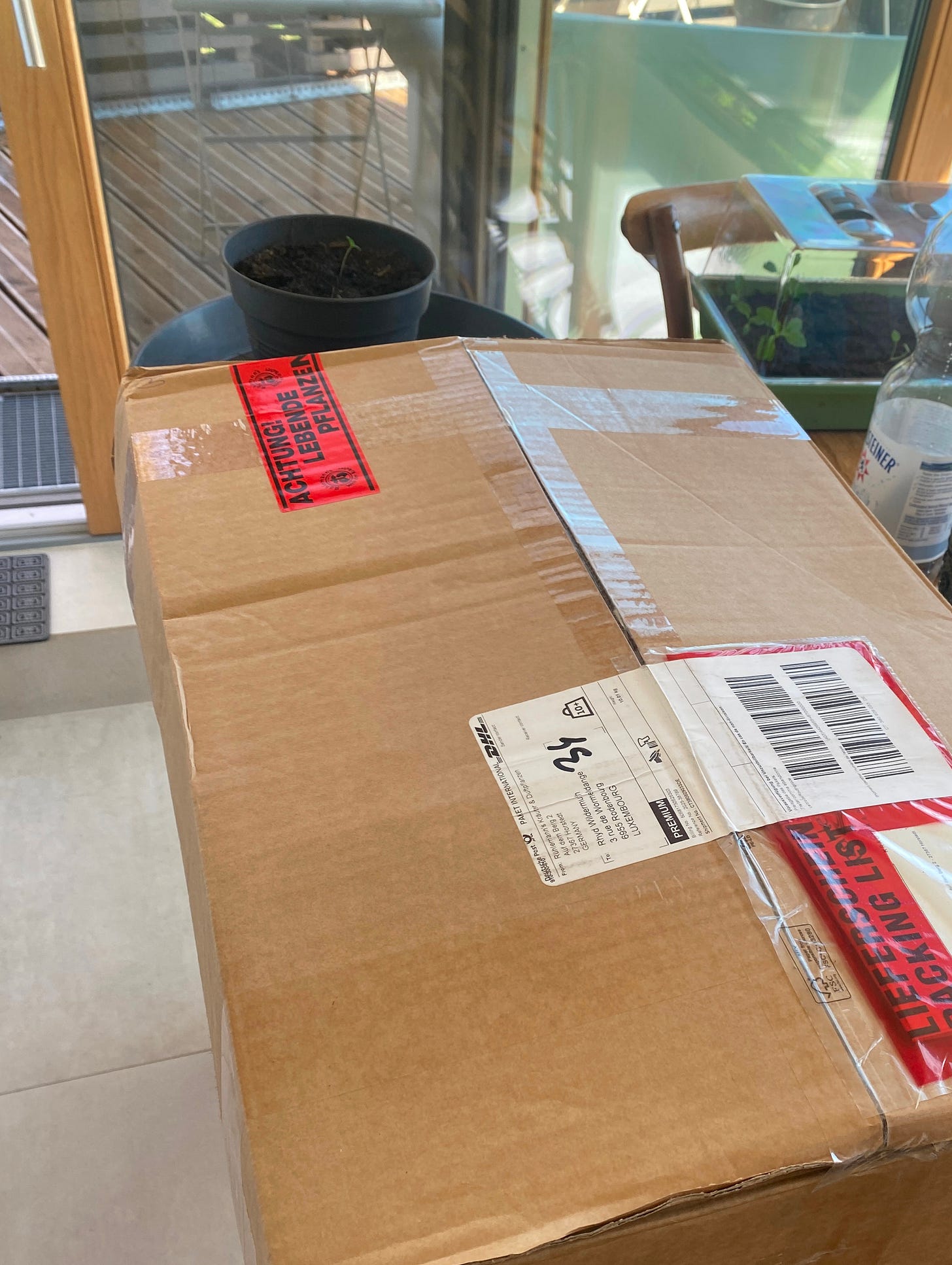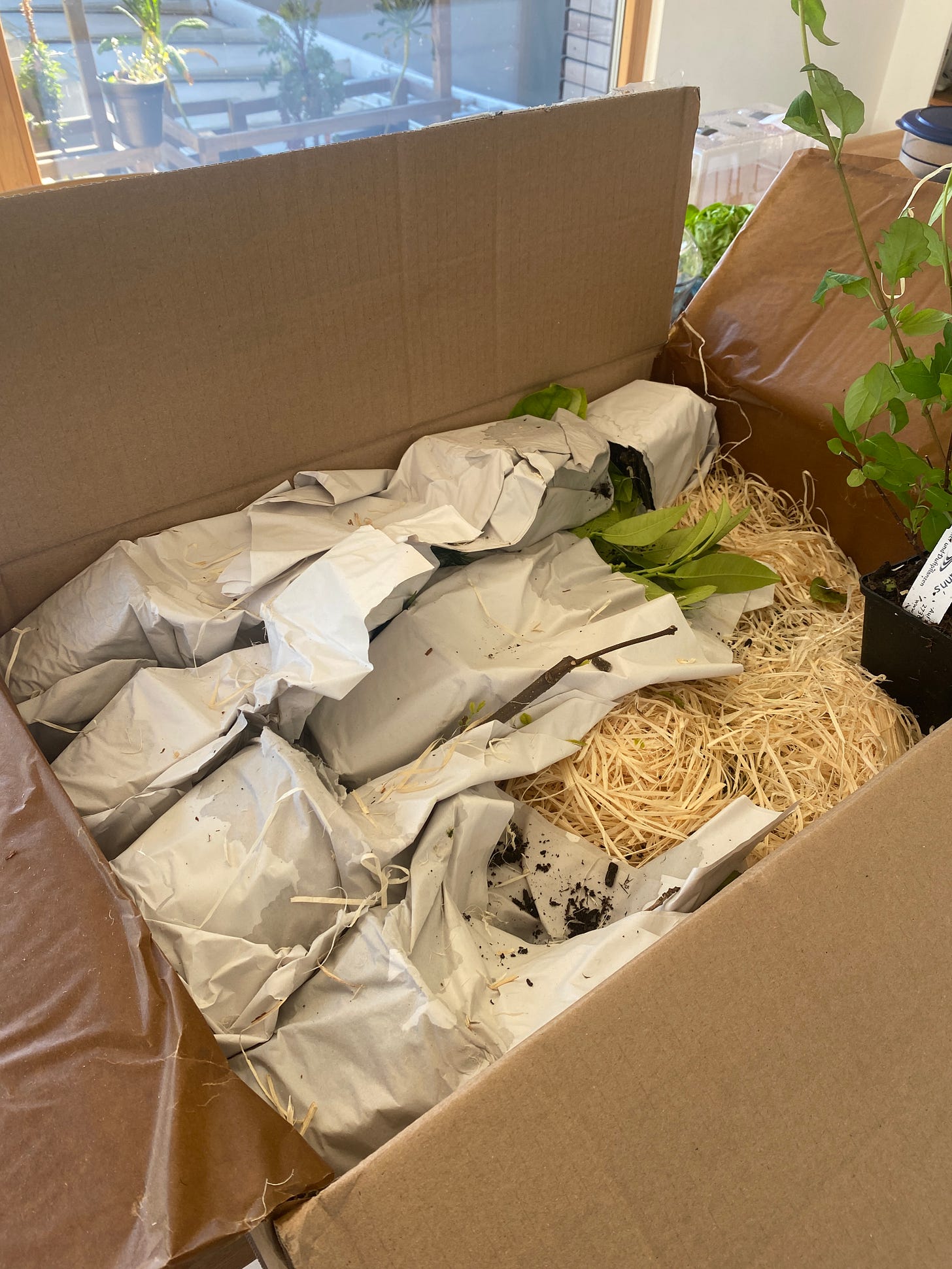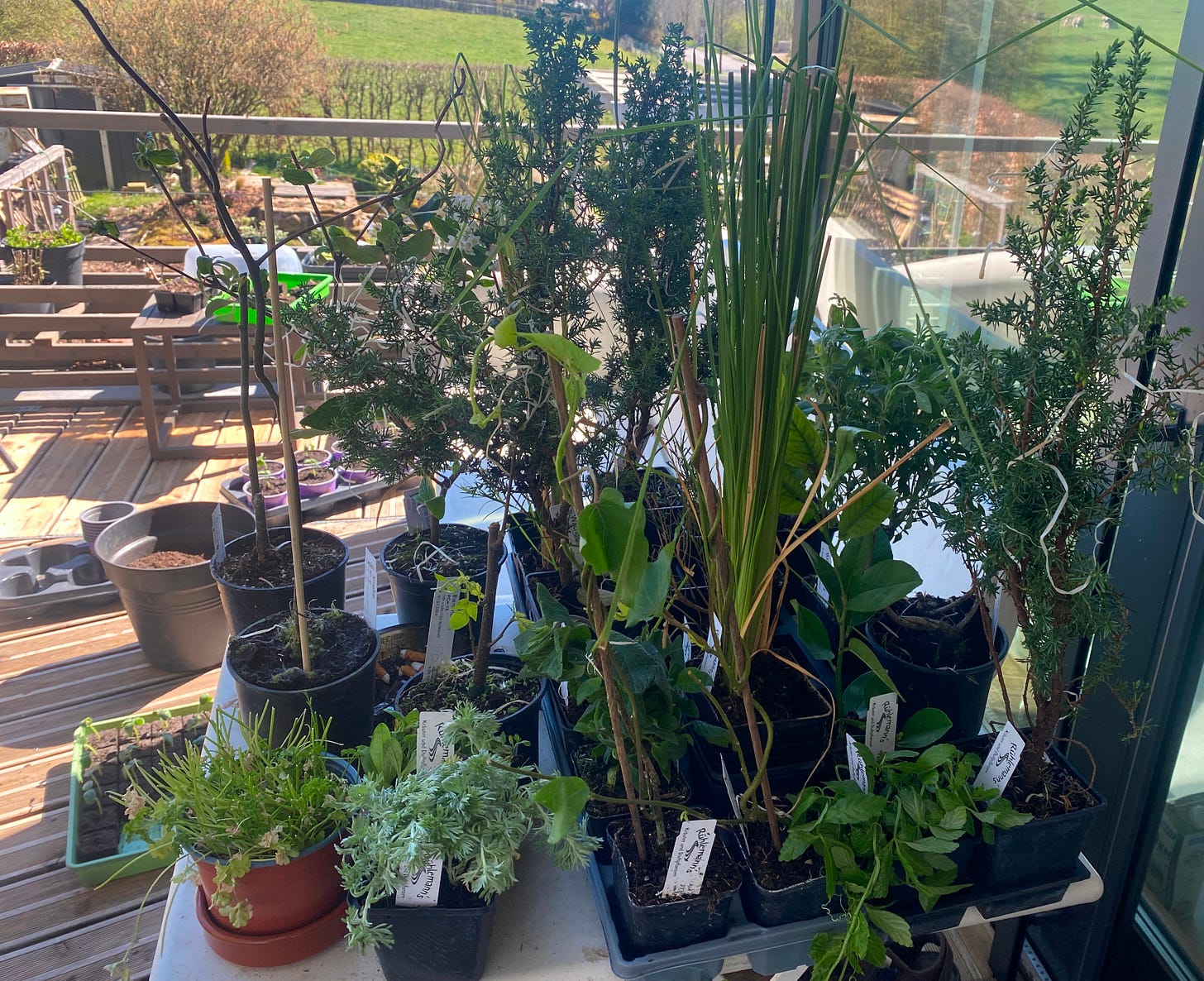Sundry Notes, April
Emergency transplants, OG leftism, actual leftist antisemitism, and more demons!
I. Plant Crisis
A lot like new parents talking far too much about their newborn, probably every Sundry Notes from now until October, you’re going to get an earful about my garden. I apologize in advance, but that’s just how it’s going to be.
If you read my recent essay “Bodies Against Fear,” you’ll maybe remember I’d mentioned a very large order of seeds and plants from a German rare plant nursery. The seeds arrived in early March, and I’d been expecting the live plants to arrive in the next few weeks, preceded by a notification letting me know they’re on their way.
That’s not how it works, though. On Friday, the end of a very, very long week of work and gym, while taking a brief coffee break on my balcony, my mother-in-law alerted me to a package that had just arrived and, despite all my other plans for the day, that’s what I ended up doing instead.
You know how in medical dramas when they wheel in a gunshot victim and there’s this moment of panic when everything else is dropped and people rush around to try to save the person’s life? That’s exactly what it was like.
Really. I didn’t even bother clearing off the messy table in my kitchen, and instead threw the box on it and got to work.
A few hours of emergency transplanting later, all the plants are now in better pots and have done quite well since then.
II. Another Bitter Old Hipster Leftist Rant
I’m starting to realize I sound like a bitter hipster sometimes. You know the sort I mean, the kind that hides behind an ironic nostalgia of initial discovery. “I listened to that band before they were cool,” or, “I went to that bar before everyone else discovered it.”
In my case, however, it’s constantly an absurd and exhausting refrain of “I was a leftist back when it meant anti-capitalism.”
Yeah, I know, that’s ancient history, like two decades ago. Probably a good third of my readers hadn’t even started that “outdated” biological process called puberty at that point, and by the time they’d reached adulthood the left had long become pro-state identitarianism.
What’s particularly gotten me raging impotently at the clouds are the general reactions to Trump’s tariffs and the corresponding backlash from finance capital. To explain how completely pro-capitalist the left has gotten, let me quote from some obscure text none of these juvenile leftists have apparently ever read, The Communist Manifesto:
The bourgeoisie, wherever it has got the upper hand … has drowned the most heavenly ecstasies of religious fervour, of chivalrous enthusiasm, of philistine sentimentalism, in the icy water of egotistical calculation. It has resolved personal worth into exchange value, and in place of the numberless indefeasible chartered freedoms, has set up that single, unconscionable freedom — Free Trade. In one word, for exploitation, veiled by religious and political illusions, it has substituted naked, shameless, direct, brutal exploitation.
Yeah. Leftists used to be against free trade. Not because they were against freedom, though. Instead, they knew that the “freedom” the idea offered was actually a flattening imperialism.
As Marx and Engels, those two OG leftists, explained:
All old-established national industries have been destroyed or are daily being destroyed. They are dislodged by new industries, whose introduction becomes a life and death question for all civilised nations, by industries that no longer work up indigenous raw material, but raw material drawn from the remotest zones; industries whose products are consumed, not only at home, but in every quarter of the globe. In place of the old wants, satisfied by the production of the country, we find new wants, requiring for their satisfaction the products of distant lands and climes.
And:
The cheap prices of commodities are the heavy artillery with which it batters down all Chinese walls, with which it forces the barbarians’ intensely obstinate hatred of foreigners to capitulate. It compels all nations, on pain of extinction, to adopt the bourgeois mode of production; it compels them to introduce what it calls civilisation into their midst, i.e., to become bourgeois themselves. In one word, it creates a world after its own image.
Those three sections I quoted — and in fact, much of the first chapter of The Communist Manifesto — describe the weapon by which capitalists reshape the world in their own image: globalization, or the regime of “free trade.” By forcing down the trade barriers that other peoples put up against wealthier nations, the capitalists were able to demolish their local industries and even transform their wants (the desires and values).
Coca-Cola, Starbucks, Nike, Apple, and all the other American corporate products and chain stores now ubiquitous in every city center in the world became so universal because local alternatives to all these things were destroyed.
And how were they destroyed? Free trade.
Especially during the turn of this century, thanks to Bill Clinton, Tony Blair, the World Trade Organization, and lots of other organizations with three letter acronyms, free trade became the ruling international order. Protectionist tariff regimes in the third world / global south were demolished, thus destroying local economies everywhere. What few interesting and unique products a place could still produce then became international commodities produced primarily for export.
The result of all this is the world we live in now, grocery stores filled with vegetables that have traveled hundreds or thousands of miles to get to us and are no longer grown anywhere near our home. And, at the same time, every culture in the world has been destroyed and replaced with a global mono-culture, where everyone’s got the same phone in their pockets, drinks the same soft drinks, watches the same movies, wears the same clothes, and thinks the same thoughts.
No: Trump isn’t an anti-capitalist. But his tariff scheme has thrown the most wonderful monkey wrench into this leveled, flat, universalist order of globalized capital. You know the one, right? The globalized order we protested against? And shut down a city to stop? And got arrested for?
But to read anyone who calls themselves a leftist now, you’d think what Trump is doing is the most odious and destructive thing anyone could ever do.
And most ridiculous of all is how so many of them are pointing to the reactions in the stock markets to these tariffs as “proof” that Trump is evil and destructive.
I was a leftist back when the stock market wasn’t cool. Back then, we knew it was an abstract and rigged game by which finance capital could control physical capital. The stock markets are a way for banks and investment groups to force corporations, manufacturers, and industries to fire entire sectors of their workforce and seek even more extreme profits by shifting production to the cheapest global labor markets available. Not, of course, that those public companies wouldn’t already be tempted to do that, but the power finance capital has over them acts as a powerful counterbalance to any local political or labor pressure to keep those jobs in the places the profit is made.
But you wouldn’t know that reading any “leftist” analysis currently. Instead, you’d get the impression that international trade liberates us all, that any form of localism is synonymous with reactionary or far-right nationalism, and that our very existence depends upon a perpetually-expanding stock market.
But again, I’m a bitter old anti-capitalist, a leftist before it got woke and statist and cancel-crazy.
III. Hiding Behind Dying Palestinians Isn’t a Good Look.
And speaking of cancel-crazy, you’ve probably not really heard about the “boycott” against Repeater Books, the publisher of the original edition of my book Here Be Monsters: How to Fight Capitalism Instead of Each Other.
A few weeks after writing my long essay, “What Happened to Repeater,” one of the members of the collective that tried to suppress its publication — who also happened to be employed by its previous publisher to run its social media channels — threw an adolescent tantrum on his last day on the job. The result was a few hours of social media sabotage during which he claimed that the real reason he and others were pushed out was due to their pro-Palestinian beliefs.
Those claims are worse than bullshit, because manure is at least good for growing things.
The result has been a weird boycott attempt of the publisher, with the very people who were trying to silence fellow authors now claiming a rich Jewish person is silencing them. And a quick scan through some of the slavish support from their social media following yields quite a few actual examples of “leftist antisemitism,” including people putting the name of the parent company and its owners in double closed parentheses to denote Jewishness.
Unsurprisingly, this cadre hasn’t noticed the double standard here. And amusingly, by the way, a mutual friend passed along a threat to me from the former publisher of Repeater, Tariq Goddard. The substance of that threat? Were I to include any of the details of my “What Happened to Repeater” essay into print, he’d sue me for libel.
So, of course, none of this has anything to do with some sort of commitment of free expression of ideas or speech. Instead, it’s all about who gets to control that speech, and they appear quite upset they no longer wear the censor hat.
Most galling, really, is the misuse of the Palestinian struggle as a cover. These social justice identitarians have set themselves up as somehow just as oppressed as the Palestinians they claim to defend. Sure, Gaza might be getting razed to the ground, but also a group of upper middle class would-be philosophers who shat where they ate don’t get to control what their former employer’s editors choose to publish any longer.
I mean, with intersectionality, it’s all the same struggle, right?
I doubt all the signatories to this boycott know the other side of the story. And I also doubt their boycott will even do any real harm to Repeater. But honestly, it’s all odious. It’s definitely also worth reading Daniel Tutt’s very mild explanation of what’s happening.
And no, I’m not worried about that legal threat — I’m not so easily bullied.
IV. “The World Is Full of Demons”
You may have already read the excerpt from Joe Grim Feinberg’s upcoming book, A Demonology of Desires, that I hosted here. He’s also just posted a quite interesting — no, actually brilliant — essay on his substack about demons worth your attention:
The notion of demons reminds us—at least it reminds me—that there’s more to reality than belief and disbelief. I don’t have to believe that the Israelites’ Lord resided in a cloud of smoke in order to understand that He was real, because he was a part of Israelite social reality. The people acted as if He were with them, and that made Him real.
We tend to look at reality—at least insofar as we’re influenced by the system of Western thought that developed from an exploration and then negation of Christian and Muslim theology—as if the world of fiction were strictly distinguishable from the world of reality, the way false gods (fictions) can be distinguished from the true God (reality). Or the way the false God (fiction) could be distinguished by modern science from true matter (reality). I prefer the subtlety of a world populated by fictions, by demons, who are all real in different ways, in different modes.
Polytheism, which might also be called polydemonism (not to be confused with pandemonium, although they might not be unrelated) has the advantage of recognizing the role of fictions in reality. In many traditions, including ancient Greek religion, a wide array of abstract concepts could take on the character of demons or gods. Of course, if the Sun (Helios) or the Earth (Gaia) is described as a god who does human things, we are inclined to take the story as metaphor, which is one way of being true, or at least of being real. But what of Time (Chronos), for example, or Love (Eros), or Night (Nyx), or Day (Hemera)? What is an abstract concept, if not a demon? It exists, but we can’t touch it. It exists, not because we believe in it, but because we use it, we act as if it existed, everyone around us acts as if it existed, we don’t bother asking if it exists.
But demons are concepts that are scary. Not because they’re evil, but because they seem to take on a life of their own. Even if humans made them, they’ve become strange to us. They’re hard to identify, hard to see, they hide out the dark corners of rooms and of the imagination. They seem to have power over us, but we don’t know quite where and what they are. We fear them, in other words, for the same reason we might fear any god.








I'm upset about the tariffs, but for the same reason you're optimistic about them. I think they've been thrown together in such a slapdash, retaliatory way that the very idea of tariffs will end up taking another century to recover from. I would love to see some tariffs put in place to encourage local ag and manufacturing and to ensure that companies can't benefit from outsourcing everything to places lacking labor and environmental protections, but instead we're busy picking fights with Canada and Denmark. And nobody's going to invest in domestic manufacturing when the tariff landscape is changing weekly, daily, or even hourly - companies need to believe the tariffs will stick before they set up factories in the US again. I was hopeful these tariffs would work when I heard Vance talk about them during this campaign, but I'm nervous they're just going to fail so miserably we'll end up with another 80-year backlash on the idea.
(I do feel a good bit of schadenfreude when the market dips though, despite my own retirement accounts!)
I’m glad you’re not easily bullied! 🙏🏼❤️🔥 You put into words what has been bugging me about the resistance to tariffs. Why *shouldn’t* we sustain ourselves with who and what interrelates with us where we are? I don’t like what Trump wants to do to our lands, but it’s what we’ve been doing to other lands. The real change required, one way or another, is degrowth—or a return to growth, decay, death, and regrowth, which is the way of things, anyway. I’m still gearing toward local, reciprocal, organic, and plastic-free.